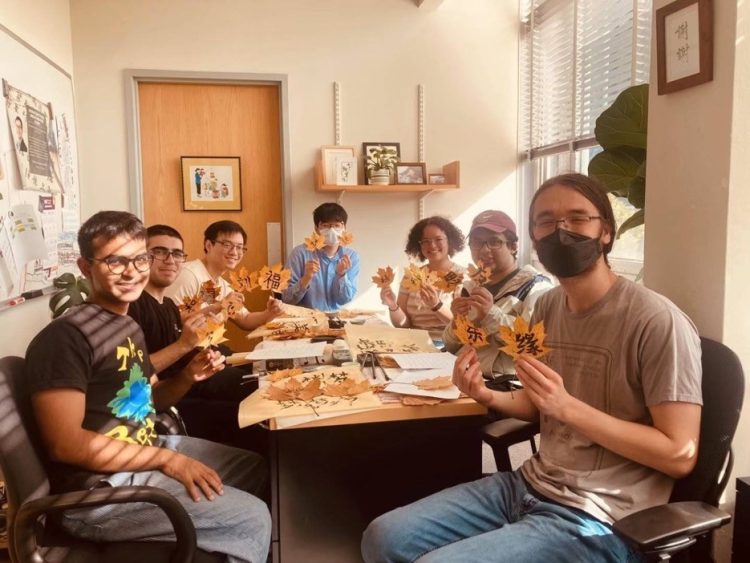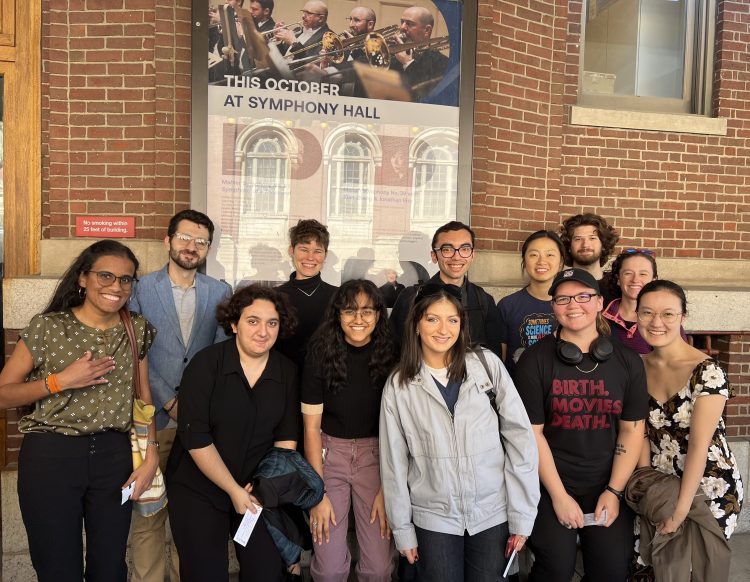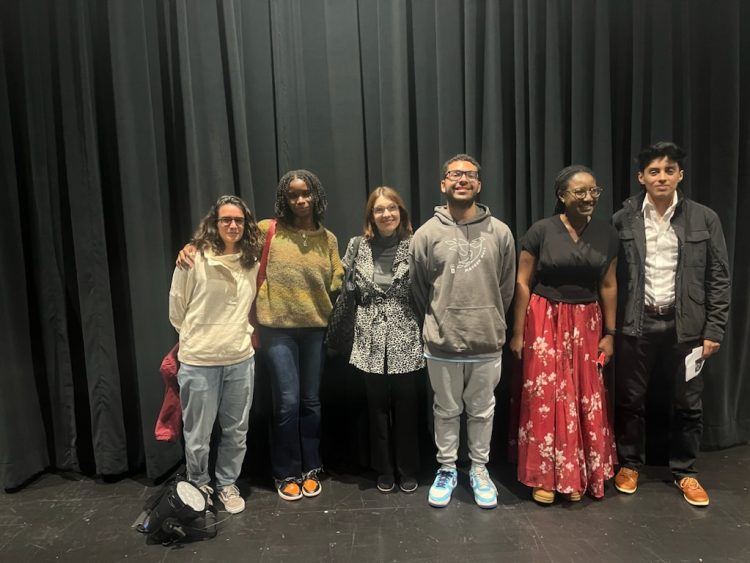
Events
The Korean Language Program held its annual event to celebrate Hangul Day on Thursday, October 10th, organized by Hee-Jeong Jeong. Hangul, the Korean writing system, was created by King Sejong in A.D. 1446; this was the 578th Hangul Day. A total of fifty-one participants, including current and former students, joined the celebration, which featured quizzes and games about Korean language and culture. The event provided an opportunity for students to connect with others who have taken or are currently taking Korean language classes, and also encouraged greater interest in Korean language, culture, and history. Attendees enjoyed a variety of Korean instant noodles and kimbap, adding to the festive atmosphere.
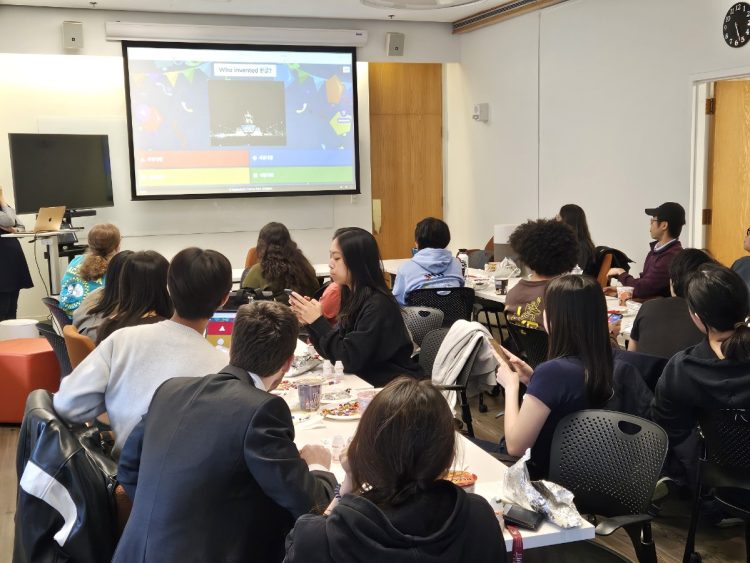
On October 25th, Tong Chen organized a themed lesson for his Chinese V class, focusing on “Perspectives on Marriage and Love among the Chinese.” As part of this lesson, Tong invited a special guest speaker, the manager of a Michelin-starred restaurant in China, to deliver a fascinating talk on Chinese love and marriage. The talk covered both historical and modern perspectives, along with personal experiences. The presentation sparked a surge of interest among the students, prompting numerous insightful questions on the topic.
In addition, as part of a themed lesson on “Chinese Traditional Holidays and Their Food” in Chinese V, students participated in a sharing session where they talked about the foods served during their own traditional holidays. Following this, they engaged in a hands-on activity, practicing the art of dumpling making. During the process, they also discussed the symbolic meanings and traditions associated with dumplings in China and elsewhere
The Japanese language group, in collaboration with MISTI-Japan, hosted an event in the Bush Room on October 25th titled “Japan@MIT.” This event aimed to introduce MIT’s Japanese and Japan-related courses to interested students, as well as the MISTI-Japan internship program. The event was also honored by a guest speaker from the Consulate-General of Japan in Boston.
Meanwhile, on October 31st, Kang Zhou enhanced cultural engagement in Chinese 101 by organizing a tea tasting and calligraphy activity, where students wrote meaningful Chinese characters on autumn leaves with brushes.
Emily Goodling continued to organize the German language table, Stammtisch, where students can attend to speak conversational German in an informal setting, eat pizza, and listen to music. These events have attracted students from every German class taught at MIT and beyond, with an average of seventeen students attending each meet-up this semester!
At the beginning of October, Emily Goodling also took eleven students from multiple German classes to the Boston Symphony, to see a performance of Austrian composer Gustav Mahler’s “Symphony of a Thousand,” with tickets generously purchased through a Council for the Arts at MIT grant.
The French lecturers took their students to see the play La Femme à qui rien n’arrive (The Woman to Whom Nothing Happens), at Huntington Theatre on Nov. 8th. Information about the French-language play, a U.S. premiere performed with English subtitles, is available at its official website.
Throughout this semester, attendees of Solta a Língua, the Portuguese conversation sessions organized by Nilma Dominique, continued to connect with local members of the Lusophone culture. They consider themselves fortunate to have hosted Adam K. Bahrami, a luthier, scientist, and musician from Los Angeles, now residing in São Paulo, who gave a fascinating talk on the creation of the five-string rabeca.
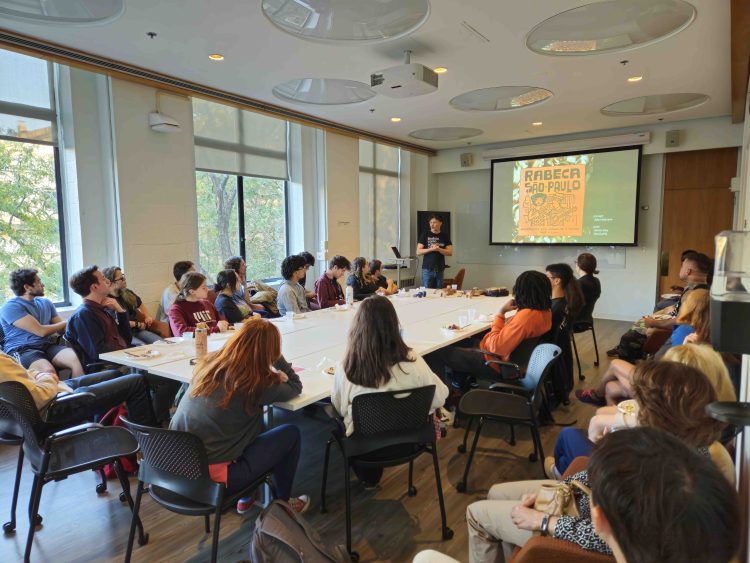
The language table also welcomed Samia R. Silva de Castro, a Research Scientist at MIT’s McGovern Institute for Brain Research, and Silvia Follador, a PhD student at MIT’s Women and Gender Studies (WGS) program, to speak about their paths of research.
Nilma Dominique took a group of students to a bossa nova show by Joyce Moreno at Regattabar on September 21st. Joyce Moreno is considered one of the most important female voices of the Bossa Nova, and was performing an album which has been unreleased since the 1970s.
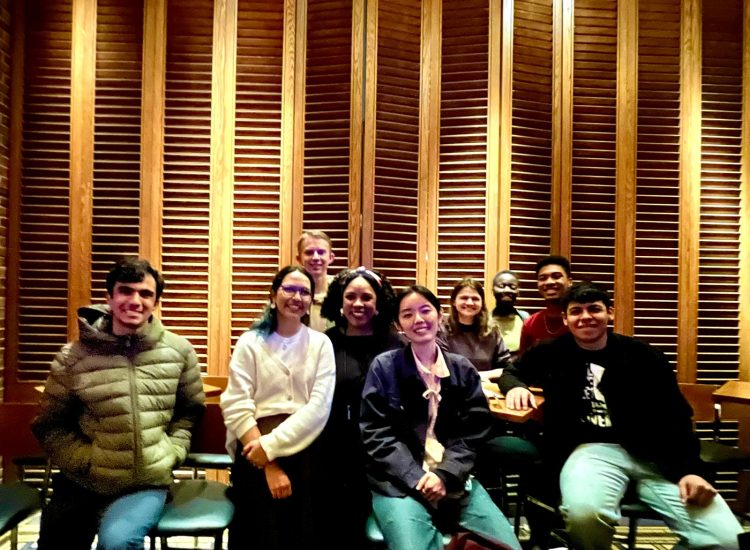
On November 15, 2024, Dagmar Jaeger’s German IV students visited the Made in Germany? Art and Identity in a Global Nation exhibition at the Harvard Art Museums. A standout piece in the exhibition was Corinne Wasmuht’s monumental 50 U Heinrich Heine Straße, which had been a focal point of discussion in their German IV class. Students explored themes of identity and public space in Wasmuht’s work, while also examining broader concepts of transnationalism through other works featured in the exhibit. https://harvardartmuseums.org/exhibitions/6286/made-in-germany-art-and-identity-in-a-global-nation
Publications
In June 2024, Emily Gooding published an article titled “Theatre as Refuge: Staging the War in Ukraine at Berlin’s Schaubühne” at The Drama Review.
In August, Tong Chen published a book, Snapshots: Mini-Stories for Beginning Chinese, Volume I (Cheng & Tsui, Boston, 2024). This book aims to reinvent Integrated Chinese I and II, one of the most popular beginner Chinese textbooks in North America, by presenting lively and intriguing real-life stories infused with Chinese cultural elements. By embedding grammatical structures and vocabulary within engaging narratives, the book aims to bring these linguistic elements to life and deepen students’ understanding of the material they have learned. Additionally, it includes practice exercises that emphasize the functions of grammar and the usage of vocabulary, ultimately enhancing students’ reading comprehension, listening, and oral expression abilities.
Maria Khotimsky’s early 2024 publications include “Games and Gamification in a Russian Language Classroom,” co-authored with Svetlana Nuss, American Council of Teachers of Russian Newsletter, Summer-Fall 2024: 1-5.
She also released a book review of Old Songs by Olga Sedakova, translated by Martha Kelly (Seattle: Slant Books, 2023), in the Slavic and East European Journal, 68.2 (Summer): 265-266. Please see this page that explains how to purchase the issue.
In December 2024, Contemporary Translation in Transition: Poems, Theories, Conversations, co-edited by Maria Khotimsky, Friederike Reentz, Henrieke Stahl, and William Waters, was published by the Academic Studies Press. In addition to being one of the co-editors, Khotimsky contributed a chapter titled “Translation and Translingualism in the Works of Contemporary Russophone American Poets.” You can read more about this project. An open-access version of the book will be available soon.
Khotimsky also collaborated on Choose to Study Russian for Professional Needs, an open educational web resource for promoting advanced-level language proficiency and connecting the study of Russian as a foreign language with other professional fields. The resource was developed jointly with Dr. Svetlana Abramova (Washington University) and Dr. Veronika Egorova (Harvard University). Work on the project was supported by a STARTALK grant.
Takako Aikawa co-authored a paper called “Pecha, a Language Practice Peer: Guiding Language Learning Interactions through Large Language Models.” R. Lege, E. Bonner, and T. Aikawa, Technology in Language Teaching & Learning, vol. 6, no. 3, Dec. 2024, p. 1716, doi:10.29140/tltl.v6n3.1716.
Leanna Rezvani published an article entitled “Teaching French Post-COVID Emergency: Enduring Lessons in Student Retention, Technology, Equity, and Gratitude,” in the French Review, (98.2), December 2024, 95-100. The abstract is available and the article may be purchased through Project Muse.
Nilma Dominique published “A arte periférica em PLE: justiça à voz marginalizada de expressões literárias” (“Peripheral Art in PLE: Justice for the Marginalized Voice of Literary Expressions”) in Cadernos de PLE: Estudos Variacionistas e Aplicados em Língua Não Materna. You can find more information about it at HERE (Portuguese-only).
Lecturers in the News Elsewhere
Nilma Dominique was interviewed by Forbes Brazil in honor of Teacher’s Day, celebrated on October 15, 2024. Full article, in Portuguese.
Takako Aikawa and her co-authors are noted in the conference proceedings of the Institute of Electrical and Electronics Engineer’s International Symposium on Mixed and Augmented Reality Adjunct: L. Xia, C. D. Vázquez, T. Aikawa and P. Maes, “Inner Child: The Role of VR Child Avatars in Improving Adult Language Learning,” 2024 IEEE ISMAR-Adjunct, Bellevue, WA, USA, October 2024, pp. 469-472, doi: 10.1109/ISMAR-Adjunct64951.2024.00136.
Kang Zhou’s innovative use of project-based learning in his Chinese Calligraphy course (21G.111) is highlighted in a chapter of A Hybrid Approach to Teaching Chinese through Digital Humanities, CALL, and Project-Based Learning (Routledge Studies in Chinese as a Foreign Language, Routledge, 2024), authored by Professor Dongdong Chen from Seton Hall University. Routledge sales page.
Conferences and Presentations
In July, Nilma Dominique presented a lecture entitled “Transcultural Challenges: Strategies and Reflections in the Implementation of a Portuguese for Foreigners Course with a Focus on Language and Society” at the American Organization of Teachers of Portuguese/XIII EMEP Virtual Conference.
Haohsiang Liao gave two keynote speeches over the course of the year. The first was “The 3Cs and 3Ps in Communicative Approach” at the 2024 Summer Conference on Chinese Language Instruction, held by the Southern California Council of Chinese Schools at Chapman University in July 2024.
On August 25, Tong Chen was invited by the Chinese Language Teachers Association (CLTA) SIG – Teaching Chinese as a Foreign Language to Elementary and Intermediate Learners, to present a talk on “Story Weaving Dreams: Little Tales, Vast Culture, Igniting Passion, Renewing Momentum.”
Takako Aikawa spoke on “Re-envisioning Language Education in the Age of AI: The Emergence of Prompt Writing,” at the International Conference of Japanese Language Education (ICJLE), Madison, WI, in August. At the same conference, she also gave an interactive workshop, in collaboration with Prof. Motoko Tabuse (Middlebury College, Eastern Michigan State University) and Prof. Yoshiko Mori (Georgetown University). The workshop was called AI時代における日本語教師要請の課題について考える (“Exploring the Challenges of Training Japanese Language Teachers in the AI Era.”)
In September 2024, Takako Aikawa gave a workshop, in collaboration with Prof. Per Urlaub and Dr. Eva Dessein (both of this department), “What is prompt writing and why is it important?”, at the Stanford Language Center Retreat Workshop, Stanford, CA.
Aikawa was also an invited presenter at the Code Meets Culture: AI and the Future of Second Language, Literature and Culture Pedagogy conference at Villanova University, Philadelphia, PA, in September 2024, delivering “Unlearn, Relearn, and Transform: Fluid Language Pedagogy in the Age of AI.”
Nilma Dominique co-presented virtually at the Portuguese-SIG session of ACTFL, delivering a talk titled “Opportunities and Challenges in the Professional Development of Portuguese as a Foreign Language” during ACTFL’s Language Connects event on September 26, 2024.
On October 5, Tong Chen presided over a panel and presented a talk titled “Transitioning from High School to College-Level Chinese Language Education with ACTFL’s 5C Standards” at the New England Chinese Teachers Association (NECLTA) conference held at Tufts University.
In mid-October, Takako Aikawa was invited to deliver “Navigating the AI Tsunami: AI’s impact on Japanese language learning,” hosted by Portland State University’s Center for Japanese Studies, Portland, OR.
Aikawa was also an invited speaker for the virtual talk “生成AIが与える日本語教育へのインパクト: AI時代に向けての 新しい日本語教育,” hosted by 南米スペイン語圏日本語教育学会 (South American Association for Japanese Language Education in Spanish-Speaking Countries) and sponsored by the Japan Foundation of Santiago, Chile
Emily Goodling presented a paper entitled “Nicht zu wissen, wer ich bin, ist vielleicht meine letzte Freiheit: Meta-Theater and the Collapse of Authenticity on the Contemporary German Stage” at the German Studies Association Conference in Atlanta in October 2024.
Also in October 2024, Kang Zhou presented the paper “Tone and Intonation Training Strategies in Elementary Chinese Courses” at the New England Chinese Language Teachers Association 13th Conference, hosted by Tufts University.
On October 30, Nilma Dominique presented at the Global Languages Fall Colloquium, at this department, where she shared insights on “Embracing Diversity: Implementing a Portuguese Course in São Paulo during IAP 2024.”
Dominique co-presented virtually during National Teach Portuguese Week, October 21st-25th, with a talk and Q&A about the National Portuguese Exam and preparatory resources for the test on October 24th. Panels and presentations surrounding National Teach Portuguese Week were sponsored by the American Organization of Teachers of Portuguese and the American Organization of Teachers of Spanish and Portuguese.
Leanna Rezvani chaired a panel entitled “Praise Poetry from the Rhétoriqueurs to the Pléiade and Beyond” at the Sixteenth Century Society Conference in Toronto on October 31st.
In November 2024, Takako Aikawa delivered “Explore the Art of ‘Prompt Writing’ in Language Teaching,” at the AATJ (American Association of Teachers of Japanese) Annual Fall Conference in conjunction with ACTFL, Philadelphia, PA.
On November 23rd, Tong Chen served as the chair of a panel and delivered a presentation titled “Make it Stick: Using Beginner-Level Readings to Solidify Proficiency and Intercultural Competence” at the American Council on the Teaching of Foreign Languages (ACTFL) conference in Philadelphia.
Maria Khotimsky organized the “Liberating Translation” panel stream at the Association for Slavic, East European, and Eurasian Studies (ASEEES) 56th Annual Convention in Boston in November 2024, which featured three panels and one roundtable. She served as the roundtable chair for “Liberating Translation IV: Contemporary Poetry Translation in Transition,” and participated as a discussant in the panel on “Soviet Multinational Literature: Between Identity Politics and the Discourse of Empire.”
In mid-December, Takako Aikawa gave a speech titled “生成AIが与える日本語教育へのインパクト:AI時代に向けての新しい日本語教育” (“The Impact of Generative AI on Japanese Language Education: New Approaches for the AI Era”), sponsored by the Graduate Program in Japanese Linguistics and the International Student Division at Kanda University of International Studies, Chiba, Japan. Her other presentation that month was “Innovation Discovery Japan Mini Talk: Japanese Language and Culture,” as both an in-person and virtual speech, for the greater MIT community.
Haohsiang Liao’s second keynote speech of the year was “The Globalization and Localization of Chinese Language Pedagogy,” at the Second International Conference on Teaching Chinese as a Second Language, held by Kainan University in Taiwan in December 2024. Additionally, Liao gave an invited talk, entitled “Three Years of Study Abroad Programs in Taiwan,” at the Chinese Language Center of National Central University in December.
On October 30, 2024, Dagmar Jaeger delivered a presentation titled “Assessing Digital Peer-Review in L2 Writing” at the Global Languages Fall Colloquium, where she shared her research on the use of digital annotation tools in second language writing.
Other Matters of Note
Tong Chen served on the proposal review committee in 2024 for both the American Council on the Teaching of Foreign Languages and the Chinese Language Teachers Association.
Nilma Dominique worked as a reviewer and participated in the virtual defense of Dr. Samuel Figueira-Cardoso’s doctoral thesis, titled “Referential Networks in Oral Narratives from the Brazilian Amazon: Text, Sociocognition, and Interaction”, at the Department of Linguistics of the University of Warsaw.
Takako Aikawa became a member of the Board of the Japanese Language Teachers Association of New England in July 2024, and continues to serve through the publication of this newsletter. In December 2024, she was an abstract reviewer for the 2025 Spring Conference of the American Association of Teachers of Japanese, which will be held in March 2025 in Columbus, Ohio.



